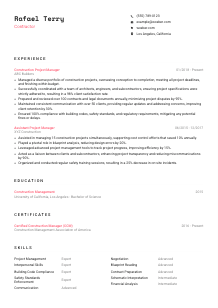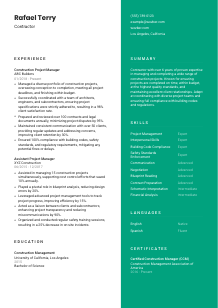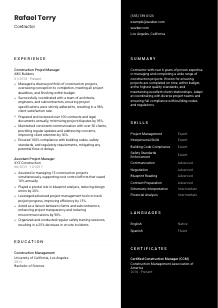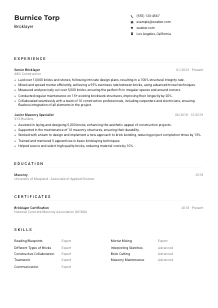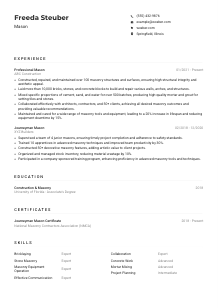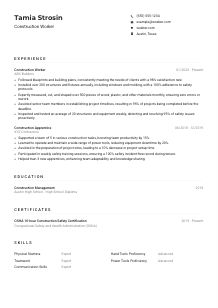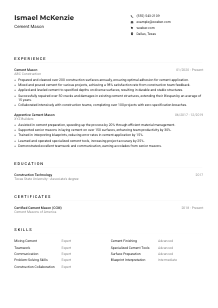Contractor Resume Example
Building foundations, but your resume feels shaky? Hammer into this Contractor resume example, nailed together using Wozber free resume builder. Grasp how you can blueprint your contracting expertise to align with job specifics, constructing a career that's as sturdy as your structures!
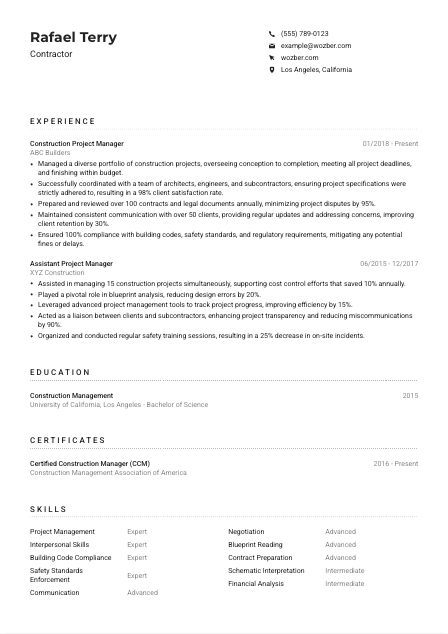
How to write a Contractor Resume?
Hello, future Contractor superstar! Stepping into the construction realm demands not only a solid foundation of skills but also the knack to present them compellingly on your resume. Your resume is more than a document; it's a blueprint of your professional journey, beaming with your achievements and capabilities. With the construction landscape as competitive as ever, your resume must stand tall, like the structures you aspire to build.
Leveraging Wozber's free resume builder, this guide is crafted to navigate you through creating a resume that aligns seamlessly with your desired Contractor position, making it ATS-friendly and impossible for hiring managers to overlook. Let's grab our hard hats and blueprint your success!
Personal Details
The Personal Details section is your foundation stone, laying the groundwork for a strong first impression. Yet, to cement your place in the Contractor role, these details must be more than just filler; they need to resonate with the job's requirements. Here's how to tailor this section to catch a hiring manager's eye.
1. Brand Yourself with Your Name
Your name is your statement of ownership on the work you've done and the projects you've brought to life. Make it prominent, setting the tone for the resume that follows.
2. Specify Your Role
Directly below your name, affirm your professional identity. Seeing "Contractor" will instantly align your resume with the job at hand.
3. Essential Contact - Precision is Key
- Phone Number: Ensure it's current. A missed call is a missed opportunity.
- Professional Email Address: Your email should echo your professionalism, opting for a clear and mature format.
4. Location Matters
"Los Angeles, California" not only matches the job requirement but reassures your readiness, minimizing any relocation concerns.
5. A Digital Footprint
If you have a LinkedIn profile showcasing your projects or endorsements, include it. Ensure it mirrors the professionalism of your resume.
Takeaway
Fine-tuning your Personal Details is like laying down the welcome mat for potential employers. It's where you begin to build interest and set the tone for the craftsmanship reflected throughout your resume. Consider this section a firm handshake in print form.





Experience
In the world of contracting, your experience is the concrete that proves your abilities. This section is your chance to showcase the projects you've managed, the buildings you've brought to life, and the challenges you've overcome. It's critical to frame your past work in a way that reflects your fit for the job you're eyeing.
- Managed a diverse portfolio of construction projects, overseeing conception to completion, meeting all project deadlines, and finishing within budget.
- Successfully coordinated with a team of architects, engineers, and subcontractors, ensuring project specifications were strictly adhered to, resulting in a 98% client satisfaction rate.
- Prepared and reviewed over 100 contracts and legal documents annually, minimizing project disputes by 95%.
- Maintained consistent communication with over 50 clients, providing regular updates and addressing concerns, improving client retention by 30%.
- Ensured 100% compliance with building codes, safety standards, and regulatory requirements, mitigating any potential fines or delays.
- Assisted in managing 15 construction projects simultaneously, supporting cost control efforts that saved 10% annually.
- Played a pivotal role in blueprint analysis, reducing design errors by 20%.
- Leveraged advanced project management tools to track project progress, improving efficiency by 15%.
- Acted as a liaison between clients and subcontractors, enhancing project transparency and reducing miscommunications by 90%.
- Organized and conducted regular safety training sessions, resulting in a 25% decrease in on‑site incidents.
1. Job Requirements are Your Blueprint
Scan the job requirements closely. Highlighting phrases like 'coordinate with architects' and 'ensure compliance with building codes' provides direction for the experiences you need to spotlight.
2. Timelines and Titles
Structure your experience by listing your most recent job first. Include the company name, your role, and the duration of your tenure. This timeline builds your career narrative.
3. Achievements Over Duties
Rather than listing job duties, focus on what you accomplished — like ensuring projects were completed on time and within budget. Quantify these achievements to give them weight.
4. Numbers Tell the Story
Quantify your achievements. Did you complete projects 20% faster than projected? Reduce costs by 15%? These figures are like GPS coordinates, guiding the hiring manager to your value.
5. Relevance is Key
Each line should serve your goal: to be the next Contractor they hire. Keep it laser-focused on what matters for the position, leaving trivia for another day.
Takeaway
Think of your Experience section as the portfolio of a master builder. Each project (or job position) you include is a testament to your craftsmanship, your ability to meet deadlines, oversee significant constructions, and handle unforeseen challenges. Sculpt your narrative with precision, and the job will be yours to construct.
Education
Education is the scaffolding that supports your career. It's essential to present this section in a way that highlights the relevance of your academic background to your contracting aspirations.
1. The Foundation
Identify the educational requirements mentioned in the job description, such as a "Bachelor's degree in a related field." Tailoring your education to these requirements immediately shows alignment.
2. Structure with Clarity
List your degree, field of study, and the institution's name, followed by your graduation date. Keep it clear and straightforward, allowing for an easy scan.
3. Degree Specifics
If you possess the degree specified in the job description, make it prominent. For instance, list "Bachelor of Science in Construction Management" to directly match the role's prerequisites.
4. Beyond the Classroom
While not always necessary, mentioning relevant courses or projects can add depth, especially if you're early in your career or if the coursework directly applies to the job.
5. Additional Accolades
Graduating with honors or participating in industry-related clubs or activities shows commitment and can be worth mentioning, particularly for those with less professional experience.
Takeaway
The Education section of your resume does more than list degrees; it communicates the foundation upon which your contracting expertise is built. Like well-laid plans, it reassures the hiring manager of your capability to execute the projects that lie ahead.
Certificates
In the contracting world, certifications and licenses are not just add-ons; they are integral proof of your expertise and commitment to professional growth.
1. Identify Relevant Certifications
Refer to the job description for cues on preferred certifications like "Certified Construction Manager (CCM)". Prioritize these in your resume to show direct relevance.
2. Quality Over Quantity
Focus on the certifications most applicable to the job. Listing every certificate you have might dilute the significance of the ones that really matter.
3. Dates Matter
Provide the certification date to indicate currency, especially for certifications that require periodic renewal. It shows you're up-to-date in your profession.
4. Continuous Learning
The construction industry evolves; so should you. Regularly seek to update old certifications and gain new ones aligned with your career goals.
Takeaway
Highlighting the right certifications is like equipping your resume with the best tools for the job. It's an assurance to employers that you're not only qualified but dedicated to maintaining high standards in your work.
Skills
Your Skills section is where you showcase the tools in your professional toolbox. For a Contractor, this means a blend of technical and interpersonal skills — all crucial for bringing projects from blueprints to buildings.
1. Extract From the Job Description
Pinpoint both the stated and implied skills in the job description. Skills like "Project Management" and "Safety Standards Enforcement" are clearly listed but also imply attention to detail and leadership.
2. Matching Your Toolkit
Identify your own skills that align with the job requirements. If "Blueprint Reading" is listed, and you're adept at it, make sure it's highlighted in your resume.
3. Keep It Organized
While it might be tempting to list every skill you have, prioritize those most relevant to the Contractor role. A focused list is more effective than an exhaustive one.
Takeaway
The Skills section is your resume's showcase of competencies. Tailoring it right sets you apart as a highly efficient contractor, well-versed in the nuances of construction. Position yourself as the candidate who not only fits the role but excels at it.
Languages
In the construction world, communication is key. The ability to converse in multiple languages can set you apart, especially in regions with diverse workforces or international projects.
1. Job Language Requirements
Start with the languages required for the job. For instance, "English language skills are mandatory" clearly indicates the primary language needed for communication.
2. Prioritize Necessary Languages
List English first, indicating your proficiency level. If your resume highlights that you're a native speaker or fluent, it matches you to the core requirement.
3. Add Other Languages
Include additional languages you speak. Each one is a testament to your ability to communicate with a broader range of clients and teams.
4. Be Honest About Your Proficiency
Clearly define your proficiency levels. Overstating your ability can lead to misunderstandings, while understating can sell you short.
5. Understand the Role's Scope
If the job involves regional or global projects, showcasing your multilingual abilities can be particularly advantageous.
Takeaway
Your linguistic capabilities extend your resume's reach and your employability. They underscore your potential to interact effectively in diverse teams and environments — a valuable asset in any Contractor's toolkit.
Summary
Think of the Summary section as the roof of your resume; it crowns your document with a concise showcase of who you are as a professional. Here's how to structure a compelling summary that will catch a hiring manager's attention.
1. Capture the Job's Essence
Understand the core of the Contractor position. Reflect this understanding in your summary, clearly indicating your qualifications and readiness for the role.
2. Introductory Highlights
Begin with a brief overview of your professional identity. Mention your years of experience and any special qualifications that make you an ideal candidate for the role.
3. Reflect Key Job Requirements
Integrate skills and achievements that directly correspond to the job's requirements. For example, mention your expert project management skills or your track record of completing projects on time and within budget.
4. Conciseness is Key
Your summary should be a teaser, not a tell-all. Aim for a balance between brevity and impact, giving just enough to intrigue and encourage further reading.
Takeaway
Your summary is the first impression a hiring manager will have of you. Make it strong, appealing, and reflective of your suitability for the Contractor role. This is your chance to shine and pave the way for the rest of your resume. Tailor it with precision, and you'll be setting the stage for a successful job hunt.
Launching Your Contractor Journey
Congratulations on completing this blueprint to a standout Contractor resume. By following these guidelines and utilizing Wozber's ATS-compliant resume tools, including free resume templates and an ATS resume scanner, you're now equipped to construct a resume that not only meets the requirements but showcases your unique skill set and experiences. Remember, your resume is the foundation of your job search; build it strong, and it will support your career aspirations.
The construction industry is ready for your expertise. With hard hat in hand and a winning resume, your next project — your new job — awaits.

- Bachelor's degree in a related field or equivalent work experience.
- Minimum of 5 years' experience in project management or general contracting.
- Strong proficiency in reading blueprints, schematics, and technical drawings.
- Excellent communication, negotiation, and interpersonal skills.
- Relevant certification or licensure, such as a Certified Construction Manager (CCM) or Licensed General Contractor (GC).
- English language skills are mandatory.
- Must be located in or willing to relocate to Los Angeles, California.
- Oversee and manage construction projects from conception to completion, ensuring all work is completed on time and within budget.
- Coordinate with architects, engineers, and subcontractors to ensure project specifications are met.
- Prepare and review contracts, change orders, and other legal documents related to the project.
- Maintain regular communication with clients, providing updates, addressing concerns, and obtaining necessary approvals.
- Monitor and ensure compliance with building codes, safety standards, and regulatory requirements.





